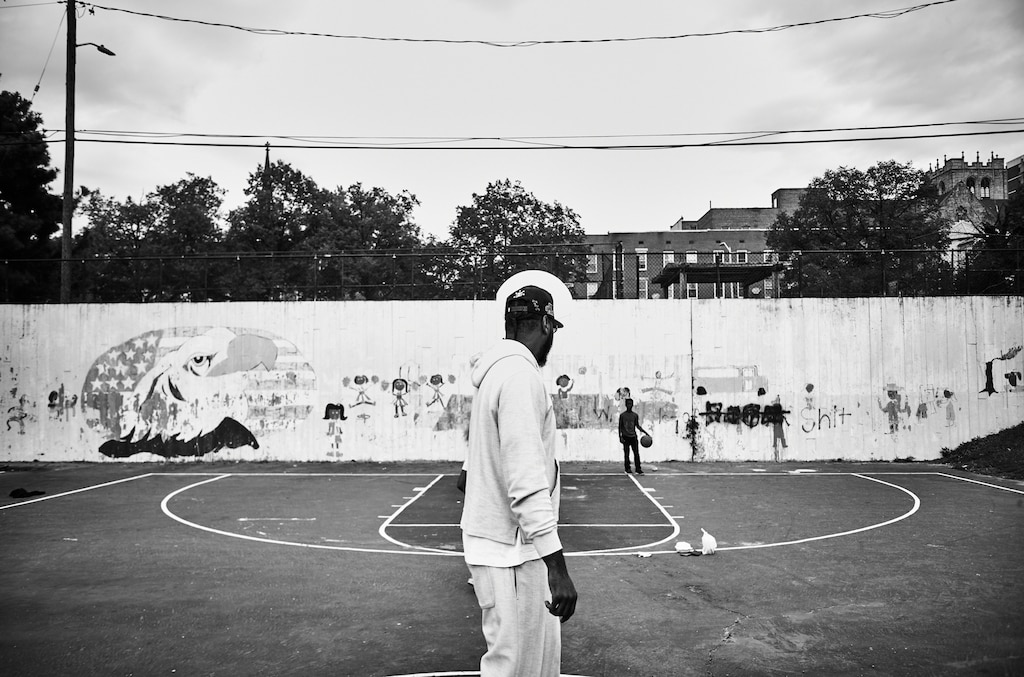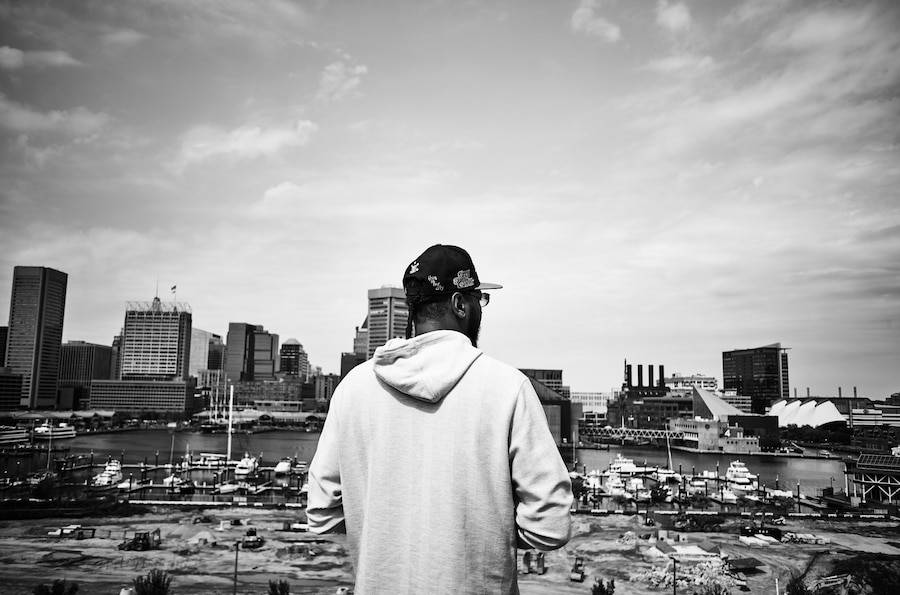As Carmelo Anthony was inducted into the Naismith Memorial Basketball Hall of Fame last month, the ex-NBA star addressed the young dreamers — kids like he once was, growing up on West Baltimore’s Myrtle Avenue.
“They will tell you it’s foolish. They will laugh at your belief. But let me tell you, they laughed at me, too,” the 41-year-old told the crowd.
It’s clear who got the last laugh.
The former Towson Catholic athlete, who moved from his native New York to Baltimore at age 8, went on to play 19 NBA seasons for the Denver Nuggets, New York Knicks and others. Never afraid to take a big shot, he earned his reputation as a prolific scorer with a silky jumper. Today, Anthony sits 10th on the NBA’s all-time scoring list with more than 28,000 points.
Now, the four-time Olympian’s career will be commemorated in “House of Melo,” a new exhibit filled with artifacts, memorabilia and other rare ephemera from Anthony’s life and career. It debuts Oct. 25 at the central Enoch Pratt Free Library.
“This is a 20-year career that these people are about to experience,” Anthony recently told The Banner. “So for Baltimore to see that and understand that they’ve been a part of that journey from the beginning — and are still a part of the journey — I want everybody to experience that.”
Ahead of the exhibit’s opening, Anthony discussed why Baltimore got “House of Melo,” misunderstandings about his career and more. This interview has been edited and condensed.
You were in Baltimore for Ravens-Lions on “Monday Night Football.” How often are you here?
I’m in Baltimore at least twice a month, primarily weekends, because of just work up here in the city [NYC}. But man, I’m in Baltimore a lot.
You could have picked New York or Denver for “House of Melo.” Why Baltimore and the Enoch Pratt Library?
For one, with Enoch, it’s a free library, so I was very adamant on doing something at the free library and giving all these kids, and just the city, the opportunity to come see something for free — something that’s elevated, something that’s highly curated, something we put time and effort into, and research. This is my way of giving back to those kids of the city in Baltimore.
And also [it’s] to get kids back into the library, right? Let’s get these kids back into the library and being creative and reading and getting some knowledge of self in a sense. … My idea’s to take back my community in a sense. I could have did New York, could have did L.A. I could have did overseas, somewhere international. I wanted to bring this back to Baltimore.
“House of Melo” was announced shortly after President Donald Trump called Baltimore a “hellhole,” and in the exhibit’s press release, you said “what’s happening politically is a distraction.” What about today’s political climate made you say let’s put the focus back on inspiring Baltimore?
It’s no secret to what we’re all dealing with in this climate, whether politically or whatever it is. We dealing with it, and we see it every day, and we hear it every day. But when you come from a place like Baltimore, you get a little bit more said about you. And I sit back and I hear it and I read it and I observe it and I see what’s going on. I see the back and forth.
So the only thing I can do is take care of this younger generation and give this younger generation an opportunity to be inspired and want to get out their situation and understand how these things are possible for them. As far as the politics goes, the politicians can handle that. I’m about making real impact, and I think this exhibit is a lot bigger than political spats.

Carmelo Anthony, who has said Baltimore “raised” him, was a star at Towson Catholic before later playing 19 seasons in the NBA. (Devin Allen + House of Melo)
I have to ask as a basketball fan: What do you think is the biggest misunderstanding about you as a player and as a person?
Man, that’s a good question. I don’t think it’s a misunderstanding. Maybe people don’t want to understand it but the level of care and grace that I walk around with — a lot of times, people can see a celebrity or somebody famous and be like, “Oh, they don’t care about this.” Me? I care about the littlest, littlest things. I care about the information. I care about people in my city. I care about the lady who lives in the middle of the block on Myrtle Avenue. I care about what they really say and I care about what they really feel because these are the people that’s on the ground, that’s being highly impacted, whether negatively or positively.
That’s what I truly care about, and the people that know know I care. But just to answer your question, I would just say that the level of grace that I have for myself and for others.
In your Hall of Fame speech, you said that everyone thinks you’re just a scorer. I was always curious about your own perception. I thought you were pigeonholed and underrated as a player.
I appreciate that. That’s a conversation you have with your friends: “Underrated or overrated?” But I look at the journey. I look at the longevity. I look at 19 years strong in the NBA. I look at playing at the highest level that you could possibly play in a sport. I look at the amount of work that I put in for 19 years in the NBA. The amount of work I put it in on my game, on my mental, my physical, my spiritual. That’s what I look at. And if you could call that underrated or overrated, I’m cool with whatever it is. But I know the journey that it took on the day to day to accomplish what we accomplishing.
Your “7PM in Brooklyn” podcast is a hit and you’re joining NBC Sports as an NBA studio analyst this fall. Do you see yourself becoming more of an on-screen presence?
With this NBC deal, we will be in-studio a lot, so talking about the game from that perspective, I’m excited about that. But the “7PM” podcast, it’s just a show that I can actually showcase [myself] and have conversation and talk. I think people are so surprised ‘cause they never heard me talk over these years like that or that much, right? So when they hear it, it’s like, “Oh shit, this is perspective. This is real-life information. This is real-life experiences that these guys actually go through or that he went through.” That’s what it’s for — to tell my story. I can only talk about my story.
Now I’m gonna grow the platform, going to grow the media company. Do I see myself primarily on screen with that? I’m still gonna do “7PM,” but I do want to build that universe out. I do want to build and create other shows.
What’s next? Are there any philanthropy efforts you and your foundation are working on?
From a philanthropic standpoint, we’re planning to bring back our foundation weekend in Puerto Rico — A Very Melo Weekend. We’re gonna bring that back in ’26. You know, working on community days and things like that in Baltimore, bringing some entertainment to Baltimore. It’s a lot, from a foundational standpoint, that we’re actually working on and discussing. In ’26, you will see more of what we’re doing being played out.

